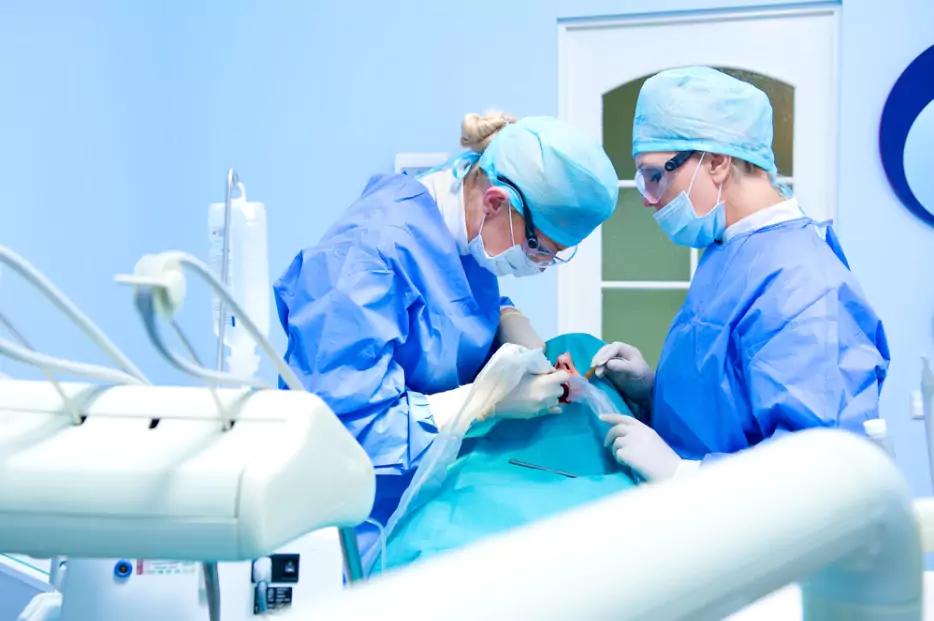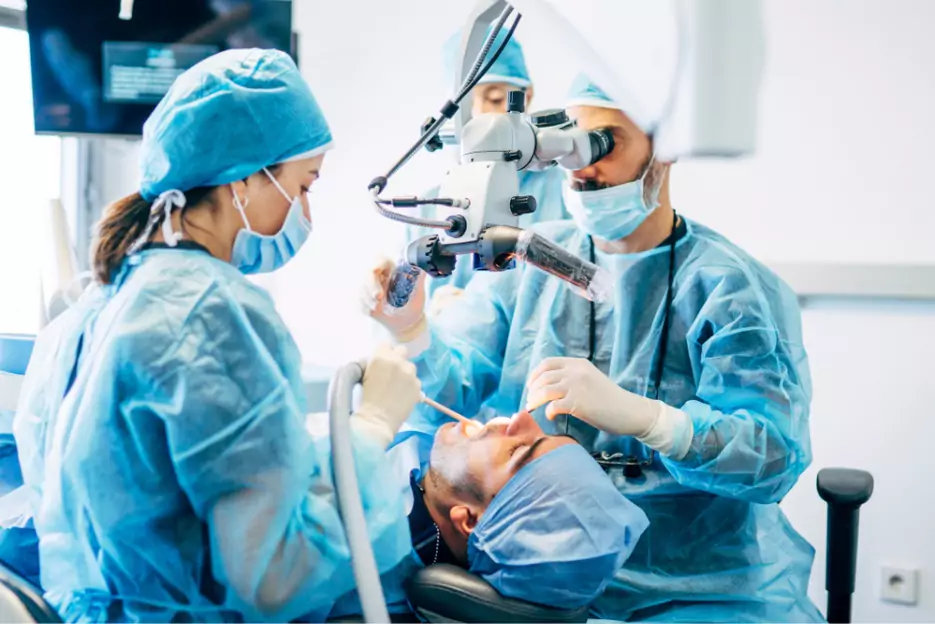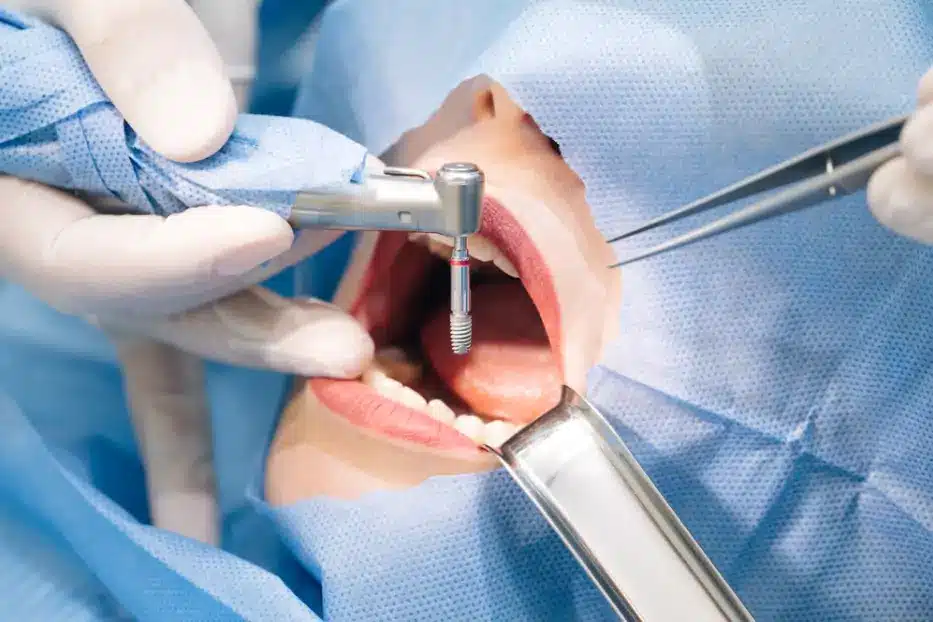Dental Implant Under General Anaesthesia

Benefits of Dental Implants Under General Anaesthesia
Dental implant treatment has become an increasingly popular tooth replacement option for people with one or more missing teeth. Dental implants offer a permanent solution to restore your broken smile and improve your overall dental health.
What payment options are there for dental implant under general anaesthesia?
The cost of a dental implant under general anesthesia can vary widely depending on factors such as the clinic’s location, the surgeon’s expertise, and the complexity of the individual case. Generally, prices can range from a few thousand to several thousand dollars per implant.
Patients often turn to payment plans and financing options to manage these costs. For example, services like Humm offer flexible payment plans, allowing patients to spread the cost over time making the treatment more accessible. This can be particularly helpful for more expensive dental implants under general anesthesia. Additionally, some patients may choose to use funds from their superannuation (super fund) to cover medical expenses, including dental treatments. This option, however, typically requires meeting certain conditions and should be considered after consulting with a financial advisor or the super fund provider to understand the implications and eligibility criteria.
How much does a dental implant under general anesthesia typically cost?
The cost of a single dental implant in Brisbane can vary significantly. A single-tooth dental implant costs approximately AUD 3,999 to $7,500. At the time of this publication, Pure Dentistry offers a single dental implant, including surgical implantation and the restoration (crown/false tooth), between AUD 3,700 to $7,500, depending on the complexity and type of implant (subject to change over time).
These costs of dental implants can be influenced by various factors, including the number of implants needed, the type of implant, any preparatory procedures such as tooth extraction or bone grafting, the materials used for the implant, the experience and expertise of the dentist, the location of the clinic, and the quality of dental care provided.
It’s also important to note that while the initial cost of a dental implant can be similar or slightly higher than alternative treatments like root canal treatment or dentures, dental implants often provide a more durable and long-lasting solution with lower maintenance costs in the long run.
For financing these treatments, there are options available in Brisbane. Dental loans via external providers such as Humm or TLC and Compassionate Early Release of Superannuation via an ATO application are two popular ways to finance dental implant treatments. These financial options can help spread the cost over time, making it more manageable for patients.
In summary, while the cost of dental implants under general anesthesia in Brisbane can be considerable, various financing options are available to help manage these expenses. The choice of financing should be made considering the patient’s budget and long-term financial planning.
What have been the experiences of patients who have undergone dental implant surgery under general anesthesia?
Patients who undergo dental implant surgery under general anesthesia generally report satisfaction with the procedure and its outcomes. In a study involving 205 patients who underwent implantation under general anesthesia, a significant majority of patients expressed total satisfaction with their implant rehabilitation. This study used the Oral Health Impact Profile (OHIP-14) questionnaire to measure patient satisfaction and found that the mean total score was 2.5, indicating a high level of satisfaction. Notably, 67% of patients scored 0, reflecting total satisfaction. Furthermore, 94.5% of the patients were satisfied with their treatment, 77.3% continued regular check-ups after treatment, 96.9% would undergo the same treatment again, and 95.5% would recommend implants to a friend or colleague. It’s important to note that younger patients, especially women, were less satisfied than older patients. This study highlights that dental-phobic patients are generally very satisfied with implant rehabilitation under general anesthesia, suggesting that this treatment can be considered a good choice for improving oral health and well-being in these patients.
The protocol for general anesthesia in these procedures typically involves a comprehensive premedical evaluation by an anesthetist and the administration of various medications for sedation, pain management, and infection prevention. The surgical procedure under general anesthesia is carefully planned and executed, with a focus on patient safety and comfort. The use of local anesthesia in conjunction with general anesthesia ensures the surgical area is adequately numbed. Post-operatively, patients are typically allowed to use their soft, relined removable dentures immediately after implant insertion, with a healing time of 6 to 8 weeks before prosthetic restoration.
Overall, the experiences of patients who have undergone dental implant surgery under general anesthesia are largely positive, with high satisfaction rates and successful treatment outcomes. The comprehensive approach to patient care, from premedical evaluation to postoperative follow-up, contributes to these positive experiences. As a dental professional, it’s crucial to ensure that patients are well-informed about the procedure, its benefits, potential risks, and the importance of follow-up care to maintain oral health and implant success.
What does the latest research say about the effectiveness and safety of dental implants under general anesthesia?
Dental implants under general anesthesia have become a widely accepted and safe procedure. The effectiveness of dental implants is well-documented, with success rates typically above 95% in healthy individuals. This high success rate is attributed to advancements in implant technology, improved surgical techniques, and a better understanding of bone healing and osseointegration (the process by which the implant integrates with the jawbone).
General anesthesia in dental implant surgery is typically reserved for complex cases, patients with dental phobias, or those who require extensive surgical procedures. General anesthesia allows for a pain-free procedure and enables the implant dentist or oral surgeon to work without patient movement, which can be crucial in intricate procedures that require surgical precision.
Safety in dental implant surgery under general anesthesia is a paramount concern. Modern anesthetic techniques and monitoring equipment have made general anesthesia safe for dental procedures. However, as with any surgical procedure, there are risks associated with anesthesia, such as adverse reactions to anesthetic agents, respiratory complications, and, in rare cases, anesthesia-related mortality. These risks are generally low, especially when an experienced dental anesthesiologist performs the procedure in a well-equipped facility.
Moreover, patient selection is critical for ensuring safety. Before undergoing dental implants under general anesthesia, patients are typically evaluated for any medical conditions that might increase the risk of complications. Those with significant systemic diseases, such as uncontrolled diabetes, significant cardiovascular disease, or severe respiratory conditions, may require special considerations or alternative treatment approaches.
It’s also important to note that post-operative care plays a crucial role in the success of dental implants. Patients are advised on proper oral hygiene, medication management, and follow-up appointments to monitor the healing process and implant integration.
In conclusion, the general consensus in the dental community is that dental implants under general anesthesia are a highly effective and safe treatment option for eligible patients. However, individual patient factors and the expertise of the dental team are critical components in determining the success and safety of the procedure.
However, the thought of undergoing dental implant surgery can be daunting for some people, especially if they have dental fears and are already anxious about dental procedures.
The good news is that you do not have to postpone restoring your smile due to dental anxiety, thanks to general anesthesia.
General anesthesia (GA) has several benefits and can be used for many dental procedures, including dental implant surgery. It can help alleviate anxiety and discomfort in nervous patients, making the procedure easier and less stressful.

Reduced Anxiety
Dental implant surgery under general anesthesia can significantly reduce a patient’s anxiety. Most patients experience fear or anxiety about an upcoming dental treatment, especially if the procedure involves surgery.
Anxiety can lead to avoidance of necessary treatment or difficulty in completing the procedure due to nervousness, this dentist in Perth says. Patients under general anaesthesia are completely unaware of the surgery and will not feel any pain or discomfort, making the experience more comfortable overall.
Increased Comfort
Because the patient is unconscious during surgical procedures, they will not feel pain. Therefore, they can undergo extensive treatment, such as bone grafting surgery or having multiple implants inserted into their jaw bone, without experiencing discomfort. Dental implant procedures under GA can be especially beneficial for a patient with dental anxiety or a low pain threshold.
More Efficient Procedure
Because the patient is unconscious during dental surgery, the dentist can perform the procedure with greater ease and accuracy, leading to a smoother and more comfortable overall experience for the patient and the dentist.

What to Expect From a Dental Implant Procedure Under General Anaesthesia
Here’s a brief overview of what to expect from dental implant treatment under general anesthesia.

Consultation Appointment
Patients typically require a consultation appointment with their dentist before undergoing an implant procedure under general anaesthesia.
The dentist will assess the patient’s oral health to ensure they are a suitable candidate for the procedure. The dentist may also evaluate the patient’s bone density to determine if bone grafts will be necessary.
The dentist will discuss the dental implant process and answer any patient questions.
Dental Implant Surgery (Implant Placement)
An anaesthetist will administer general anaesthesia and will cause the patient to be fully asleep during the dental implant procedure. The patient’s vital signs will be closely monitored throughout the procedure when a general anesthetic is administered.
Dental Implant Surgery (Implant Placement)
Once the patient is under anaesthesia, dental implant surgery can begin. The dentist will carefully place one or more dental implants into the patient’s jawbone during the procedure. Implant posts will eventually fuse with the bone, creating a strong, stable foundation for the replacement tooth. The surgery typically takes a few hours to complete, and patients will be monitored in a recovery room after the procedure to ensure they are safe.
Aftercare Instructions
Patients will receive detailed aftercare instructions from their dentist. They may be asked to avoid certain foods, take pain medications, and practise good oral hygiene to ensure the implants heal properly. Patients may also need to return to the dentist’s office for follow-up appointments to monitor their progress and make any necessary adjustments.
With proper care, dental implants can last several years and offer patients a natural-looking solution for tooth loss.
Sedation Dentistry
Sedation dentistry refers to medication to help anxious patients feel more relaxed and comfortable during dental treatments. Sedation can range from mild sedation that keeps the patient awake and relaxed to deeper levels that may make the patient feel drowsy or even fall asleep.
General Anaesthesia involves a medically-induced loss of consciousness and is sometimes used in dentistry for complex or lengthy treatments, such as bone graft surgery.
Sleep Dentistry for Dental Implants in Brisbane
Dental implants, especially with sleep dentistry, offer a transformative solution for individuals with missing teeth. Unlike traditional dentures or bridges, dental implants are surgically placed into the jawbone, providing a stable and long-lasting foundation for replacement teeth. This integration with the bone ensures that the implants stay securely in place, offering a permanent solution that closely mimics real teeth’ natural function and appearance.
One of the key advantages of dental implants is their ability to preserve jawbone and facial structure. When a tooth is lost, the underlying jawbone can deteriorate over time. Dental implants act as artificial tooth roots, stimulating the jawbone and preventing this bone loss. This helps in maintaining the natural contours of your face, contributing to a more youthful appearance.
According to Brisbane Dental Sleep Clinic, Sleep dentistry can be particularly beneficial for patients who experience dental anxiety or have complex dental needs. Sleep dentistry, also known as sedation dentistry, allows patients to undergo dental procedures, including the placement of dental implants, while in a state of deep relaxation or sleep. This can be a comfortable and anxiety-free experience for patients, making it an ideal choice for those who are apprehensive about dental procedures.
The procedure for dental implants under sleep dentistry is generally not painful, as it is completed under sedation. This can be a significant advantage for patients who are nervous about experiencing pain during dental procedures. After the procedure, once the sedation wears off, patients may experience mild pain, which is typically manageable.
Moreover, dental implants offer several other benefits, such as improved oral health. They do not require altering or compromising adjacent teeth, often necessary with bridges. This preservation of neighbouring teeth allows for better oral hygiene practices, making dental implants a hygienic option that promotes healthy teeth and gums.
In conclusion, dental implants, particularly when combined with sleep dentistry, can be a highly beneficial solution for patients with missing teeth, offering improved appearance and function, durability and longevity, jawbone and facial structure preservation, and oral health. They provide a comfortable and stress-free option for those who may have anxiety about dental procedures, ensuring a positive and effective treatment experience.
Your Anesthesia Options for Dental Implants
Various anesthesia options are available to patients who want to replace their natural teeth. The most common anesthesia options are IV sedation and local anesthesia or local anaesthesia. Other options include nitrous oxide, also known as laughing gas. General anesthesia is another option that can be used during dental implant procedures, although it is less commonly used than IV sedation or local anesthesia.
IV sedation involves the administration of medication intravenously to induce a state of relaxation and unconsciousness. This type of sedation is typically recommended for patients who experience anxiety or fear during dental treatment. Patients who receive IV sedation for dental work will typically be able to respond to their dentist’s instructions throughout the surgical procedure.
Local anaesthetic involves the injection of medication directly into the area of the mouth where the implant will be performed. Local anaesthesia is typically used to numb the area where dental implants will be placed and is often used with other anesthesia options.
Nitrous oxide (laughing gas) is a type of sedation inhaled through a mask placed over the nose. This option is commonly used to help patients feel more relaxed and comfortable during dental treatments.
General anesthesia involves using medications to induce a temporary state of unconsciousness, which allows the patient to remain completely unaware of the dental treatment.
A general anaesthetic is typically only used for patients with a medical condition that makes it difficult to tolerate other types of anesthesia or for patients requiring extensive dental work that may take several hours to complete.





































